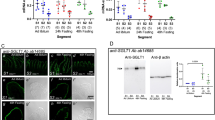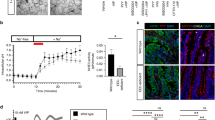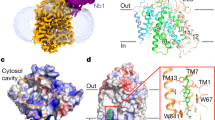Abstract
IT is well established that at least part of the glucose transfer mechanism in the intestinal epithelium lies close to the luminal border of the cell. As Rothstein1 has shown that uranyl ions exert a surface action in yeast cells in inhibiting hexose transfer, and Ponz2 and Ponz and Lluch3 have shown that they interfere with absorption of actively transported sugars, the effect of uranyl nitrate on hexose transfer in the rat small intestine was investigated.
This is a preview of subscription content, access via your institution
Access options
Subscribe to this journal
Receive 51 print issues and online access
$199.00 per year
only $3.90 per issue
Buy this article
- Purchase on Springer Link
- Instant access to full article PDF
Prices may be subject to local taxes which are calculated during checkout
Similar content being viewed by others
References
Rothstein, A., Circulation, 26, 1189 (1962).
Ponz, F., Rev. esp. Fisiol., 8, 217 (1952).
Ponz, F., and Lluch, M., Rev. esp. Fisiol., 14, 217 (1958).
Fisher, R. B., and Parsons, D. S., J. Physiol., 119, 224 (1953).
Newey, H., and Smyth, D. H., J. Physiol., 164, 527 (1962).
Author information
Authors and Affiliations
Rights and permissions
About this article
Cite this article
NEWEY, H., SANFORD, P. & SMYTH, D. Uranyl Ions and Intestinal Hexose Transfer. Nature 205, 389–390 (1965). https://doi.org/10.1038/205389a0
Published:
Issue Date:
DOI: https://doi.org/10.1038/205389a0
This article is cited by
-
On the orientation of lipids in chloroplast and cell membranes
Journal of the American Oil Chemists' Society (1966)
Comments
By submitting a comment you agree to abide by our Terms and Community Guidelines. If you find something abusive or that does not comply with our terms or guidelines please flag it as inappropriate.



